What makes a good science talk?
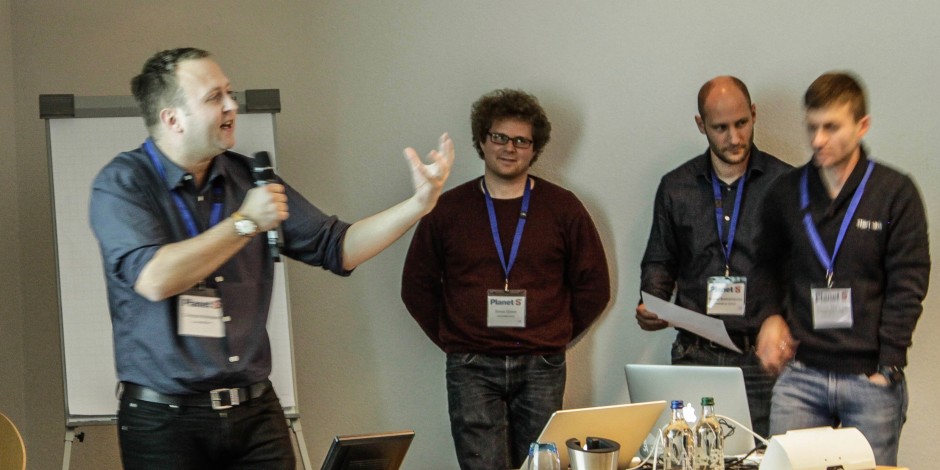
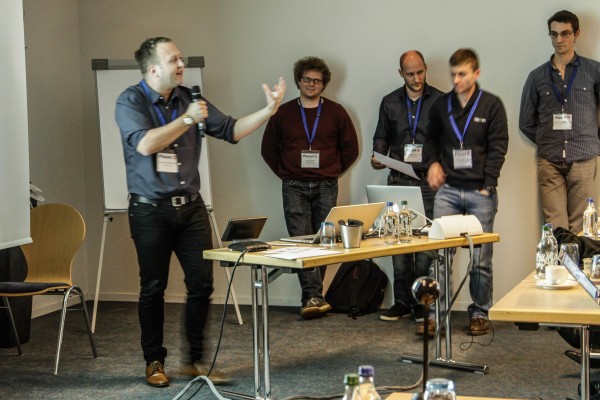
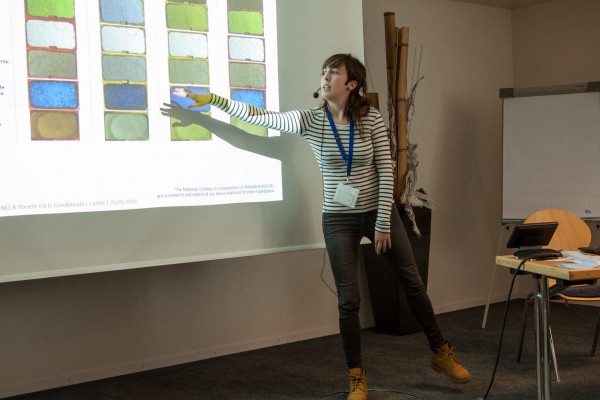
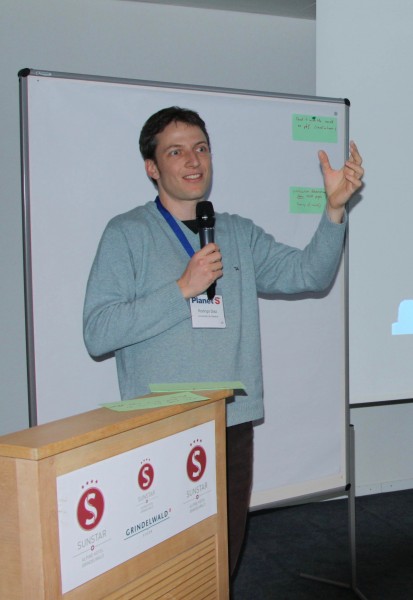
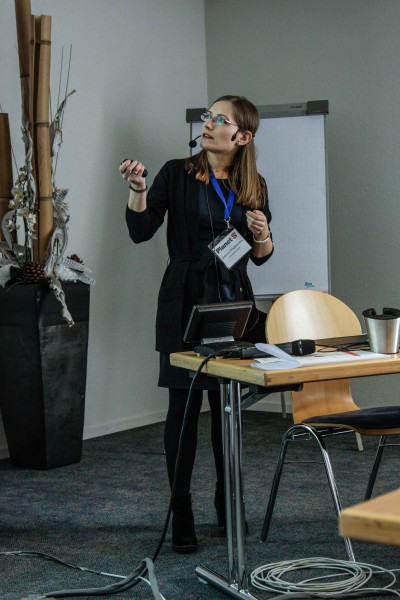 Impressions from the General Assembly 2016 (Photos: Sylviane Blum)
Impressions from the General Assembly 2016 (Photos: Sylviane Blum)
In Fall 2015, the first yearly PlanetS Professional Development workshop for PhDs students and postdocs took place. The first topic we looked at was giving a science talk. In the slides below, you will find a compilation of many suggestions – based on the principles of design, on psychology research and education research, on business presentations. Some of these hints you already know, others will be new and intriguing to you, some you will ignore, but maybe one will add a new dimension to your next talk.
http://nccr-planets.ch/wp-content/uploads/2015/09/2015ProfessionalDevelopment.pdf
At the end of this presentation, we looked at a different definition of a “good talk.” Because although there are resources and presentations and online talks and books upon books written about how to give a good talk, real life experience – at conferences, colloquia and seminars – does not confirm that great slides make a successful talk. How many times have you sat in a conference talk given by a famous scientist only to be disappointed by the slides, confused by the presentation and left feeling you understood less about the topic than before? Or seen a beautiful set of slides that did not translate into a job offer? Or watched someone break almost every rule listed in the presentation above and still be regarded well by her or his peers?
Our daily experiences of communication in academia hint at other, more subtle rules for how a talk is judged. To unpack some of these rules, a handful of PlanetS project leaders were asked to explain how they judged student and postdoc and other talks, for journal clubs, research group meetings, as well as for job interviews. They were also asked what qualities of presentation really impacted their decision to hire or not hire a candidate. They did not all agree about the goals of a particular kind of talk or about what they look for when hiring. “What makes a good talk?” is not a question with a single answer, it seems, so let’s look at what they said. (Each color is assigned to a different professor.) (A.B.)
Journal Club
Q: What do you think the goal of a Journal Club presentation is?
A: Explain what a paper is about, why it is potentially interesting for people listening, and what are the limitations of it.
A: Tell the audience a little about a new paper. Get students to read critically.
A. Present the essential information of a paper visually and orally in a way that a non-specialist in the very same field can understand it. Place the project/findings in a larger context (bigger picture)
A: In the end the audience should understand the science behind the paper presented including possible limitations and flaws.
It needs a clear but brief overview of the research questions of the paper, the (analytical) methods, the results and a critical discussion of the interpretation and results. A statement “I did not understand this part of the paper” is also okay, if e.g., the paper is not clearly written and/or there is too much “technicalese”.
Q: How should a student prepare for giving a Journal Club presentation?
A: Read and understand, in all the details, the paper. Be able to re-derive what is presented there, find what are the shortcomings.
A: Read the paper. Note the key results and present these. Try to take the audience through what they have done. Identify what is not clear.
Show via PDF. It might be an idea to take a USB stick with you so that the audience can scan through it themselves or take a copy. But don’t try to reconstruct the paper totally – life is too short.
A: Read the relevant paper plus some others related to the topic. Maybe consult a text book for the basics. Find or create appropriate diagrams to demonstrate the content of the paper. Simplify diagrams if they are very complicated, and build up complex diagram in different steps (do not show only the final complicated diagram/graph).
Research Group Talk
Q: What is the goal for giving a talk about your own research to your group?
A: Present what you are doing in the most honest way, explain what your difficulties are, and try to get inputs about your work from the rest of your group.
A: Practicing talks in a (possibly) friendly environment. Showing your supervisor that you haven’t been in the pub for the past month. Bouncing a few ideas off the assembled group. Getting the group to ask questions. Showing the student presenter that being challenged can have positive effects, too.
A: Present a research project so the audience can understand why it is/was done, what the approach was, what the problems were, the results and their implications for the bigger picture.
A: That the audience understands your research and can place it within the research field – potentially your goal might be to get feedback on open questions.
Q: How should a student prepare for a talk like this?
A: Understand what you present, look at your graphs, results, make sure that you understand every little wiggle in your curves. Ask yourself why a line is so straight, why there is noise, etc. Maybe you will not understand everything, but that’s one of the goals of the group meeting – to seek help. But at least you must have wondered about what you present. The worst is to present a result without commenting on it.
There is nothing worse than somebody showing a result and just saying “that’s what we get” and moving to the next slide.
A: Throw together 10 slides showing what you have done in the past 3 months. Nothing more.
A: Plot data nicely, split complex models into many sub-steps.
Conference Talk
Q: What is the goal of giving a conference talk?
A: Selling your research, showing how great and cool it is, and making people cite you, your group, and your results.
A: Presenting your work (obviously). Presenting yourself to future employers. Answering questions and thinking on your feet. See also : www.theguardian.com/science/occams-corner/2015/sep/03/common-conference-disasters-academia-bar
The comments will tell you that networking is now more important than the talk itself……. this is TRUE!
A: present ONE idea/model only, present something in 12-15 minutes that could be summarized in a one sentence statement. No un-essential details, just the highlights of model/results/measurement. Discuss no details, just the general broad picture.
1 slide per minute, not more, keep on time, and leave time for 2 questions.
A: To present your work and yourself to a larger scientific community (such that they think highly of it afterwards…)
Q: How should you prepared for a conference talk?
A: Work on the presentation itself (it’s cosmetic aspect). Decide what is the
message you want to bring to the audience – it should be simple (in particular for short
talks), and make the presentation in order to reach this goal.
Rehearse a lot with colleagues (in particular the first few times).
Work on your voice, and your breathing, you cannot speak without enough air.
It is very difficult to hear somebody when you have the feeling this person will die because of not enough oxygen…
A: Prepare very seriously. Don’t forget that the most important parts are the start and the finish. Remember by heart your first 3 sentences. Introduce the topic very simply with the first two slides. Have a very clear unambiguous last slide.
Don’t be too flashy ALL the time. One or two flashy slides with animations are nice, but don’t do it all the time.
Get your timing right – don’t go over time.
A: Make sure diagrams are not too complicated, not too much text, easy to read at a distance in a not too dark room. Practice speaking, and practice keeping time.
A: The conference talk is the most formal talk and thus should be prepared best (following the guidelines in the presentation above). It is always important to tailor your talk to the audience and consider their backgrounds and knowledge level. The audience should be able to understand what you did and why you did it.
Job Talk
Q: What do you really care about in a candidate’s job talk? What “bad habits” do you forgive?
A: For hiring, a talk is only a small part. What is more important depends on
the level of job you are applying for.
For postdocs:
1- They need to show they know what they are talking about
2- Communication with them should be easy
3- They should be aware of the limits of their work (I do not like
people thinking that what they do solves all the problems of the field)
In addition, of course, you have all the CV, and recommendation letters,
opinions from people knowing them, etc.
In short, an awful talk gives a bad image, and therefore a bad start. So
the talk should give people who hire a good first impression, and at the end of the talk,
people should want to talk to you.
Also very important is that people who hire you (this is now for permanent
jobs, like professor, etc) feel that you are the same kind of person as them. After all you will be their colleagues. So they should not see you as a postdoc if you want to be hired as a professor, they should see you as already looking and sounding like a professor.
A: Depth is for me an important issue. Superficial blah-blah is seen too often these days. I thought I did some of that myself when young but it is MUCH worse today in some areas. On the other hand, students presenting stuff which obviously isn’t theirs to increase their “depth” is also revealing.
I like to see what the student has actually done and to find out whether they have had the ideas or whether they just did what their supervisor told them. (You don’t go anywhere in this business without being independent).
Bringing it across so that I and others can understand it, is also important. If you can’t it is often a sign that you don’t know what’s important in the topic.
A: Not knowing what is on the slides and not being able to move back and forth through the slides. An apparent lack of enthusiasm for the content of the talk or
pretending to know something without actually knowing or understanding it.
Giving the answer: “I was told to do this (but I do not know why, but did it anyway)”
Q: What do you actually judge speakers on?
A: If they can present a coherent story with half-way decent diagrams/models. Giving the impression that they are interested in what they are talking about.
A: If the person can convince me that he/she is competent in the field and knows his/her science, then quite a bit can be forgiven. Bad slides from a postdoc however make me worry. If that person still does not know the basic rules of how to prepare slides, what other gaps might there be?
If the performance during the talk was not that good (mumbling, staring at the slides, nervous tic, etc.), I am much more forgiving, as long as I am still convinced that this person is very good at her/his science.
Q: What do you actually judge speakers on?
A: Mainly the content of the presentation and the ability to explain the content in such a way that I am convinced that they have understood the content. However, overstatements or sloppiness make me worry.
So you are now confused about what is essential in a good talk? Is the fact that different professors have different opinions worrying you? Discover what all this means in the next InsiderS.
Categories: Internal Newsletter
